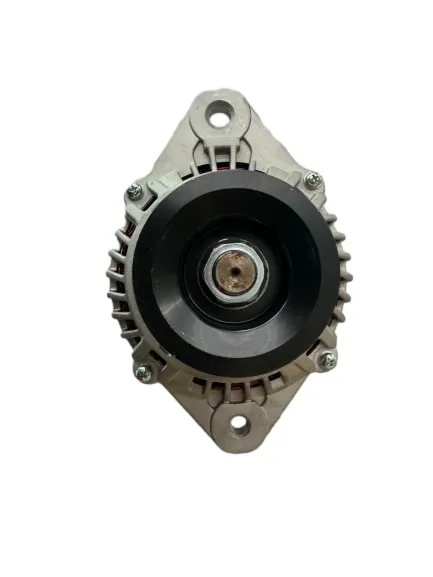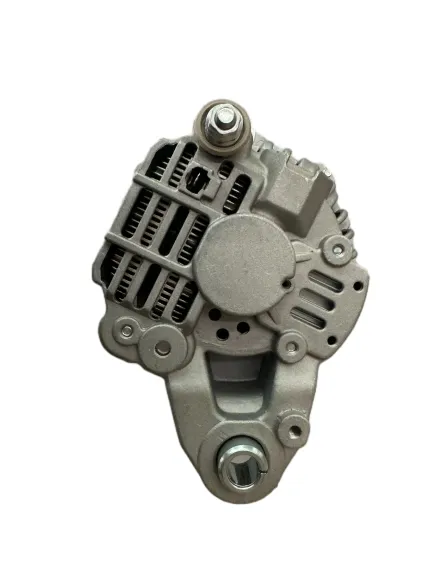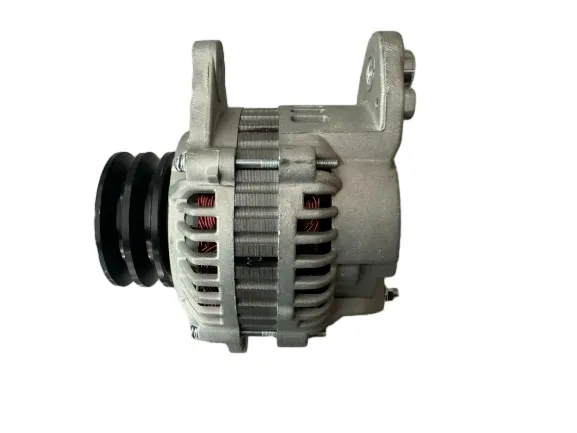Custom Built Alternators for Specialized Use Cases
The Indispensable Role of Alternators in Heavy Machinery
In the demanding world of heavy construction, mining, and industrial operations, reliable power generation is not merely a convenience but a fundamental necessity. The unsung hero ensuring continuous electrical supply to critical systems, from ignition to lighting and sophisticated onboard electronics, is the alternator. Understanding optimal alternator use is crucial for maximizing operational efficiency and minimizing costly downtime. This comprehensive guide delves into the technical intricacies, application advantages, and specialized solutions available, particularly focusing on the needs of B2B decision-makers and technical personnel in industrial sectors.
The industry trend is progressively shifting towards more robust, energy-efficient, and application-specific power generation components. As machinery becomes more complex and the operational environments more challenging, the demand for high-performance alternators, engineered for extreme durability and precise power output, continues to grow. This includes a rising need for specialized units capable of withstanding severe vibrations, extreme temperatures, and corrosive elements, ensuring the longevity and reliability of the entire electrical system.
Precision Engineering: The Manufacturing Process of High-Performance Alternators
The manufacturing of a high-quality alternator is a testament to precision engineering, involving a series of meticulously controlled processes designed to ensure peak performance and extended service life. Components begin with premium-grade materials: robust steel alloys for housing, high-conductivity copper for windings, and specialized insulation materials capable of resisting extreme thermal and electrical stress. The process typically initiates with the meticulous design and prototyping phase, often leveraging advanced CAD/CAM software to optimize internal airflow, cooling, and electromagnetic performance.
Key manufacturing stages include advanced casting or forging techniques for the main housing to ensure structural integrity and heat dissipation. Precision CNC machining follows, ensuring exact tolerances for bearing seats, stator and rotor clearances, and mounting points. The stator and rotor winding processes are highly automated, employing sophisticated machinery to achieve uniform coil tension and precise wire placement, critical for consistent power generation. Rigorous quality control is embedded at every step, adhering to international standards such as ISO 9001 for quality management and ANSI standards for specific component dimensions and performance metrics. Finished alternators undergo extensive testing, including load testing, vibration analysis, and environmental chamber testing, to simulate real-world operational conditions and verify performance and longevity, often ensuring a service life exceeding 10,000 hours in typical industrial applications.

These robust manufacturing standards make alternators suitable for a wide array of demanding industries beyond construction, including petrochemical plants, mining operations, marine vessels, and heavy-duty transportation. The benefits extend to enhanced energy efficiency through optimized design, reducing fuel consumption, and superior corrosion resistance owing to specialized coatings and material selections, particularly vital in harsh chemical or maritime environments.
Critical Parameters for Optimal Alternator Use: Data Analysis
Selecting the right alternator for specific heavy machinery applications hinges on a thorough understanding of its technical parameters. These specifications directly impact performance, reliability, and suitability for various operational demands. For instance, the Alternator A3TN5188 For CONSTRUCTION MACHINERY SERIES is engineered to meet the rigorous power requirements of heavy-duty equipment, demonstrating superior performance in challenging conditions. Below is a comparative table summarizing key parameters relevant to effective alternator use across industrial applications, highlighting what to look for when specifying components.
| Parameter | Description | Typical Range / JLT A3TN5188 | Relevance for Heavy Machinery |
|---|---|---|---|
| Voltage Output | Nominal electrical potential (Volts) | 12V, 24V, 48V (A3TN5188: 24V) | Matches vehicle's electrical system; critical for stable power delivery. |
| Current Output (Amperage) | Maximum continuous current (Amps) | 80A - 200A+ (A3TN5188: 90A) | Determines capacity to power all electrical loads, including charging. |
| Efficiency | Percentage of mechanical power converted to electrical power | 65% - 80%+ | Higher efficiency reduces fuel consumption and heat generation. |
| Operating Temperature Range | Ambient temperature limits for reliable operation | -40°C to +120°C | Ensures functionality in extreme climates (e.g., Arctic or desert operations). |
| IP Rating (Ingress Protection) | Protection against solids and liquids | IP54 to IP67 | Crucial for dusty, wet, or muddy environments common in construction. |
| MTBF (Mean Time Between Failures) | Predicted time between inherent failures | 5,000 - 20,000+ hours | Direct indicator of reliability and expected operational lifespan. |
These parameters collectively define an alternator's capability to perform under stress. Higher amperage outputs are necessary for machinery with extensive electrical loads, such as large excavators or cranes equipped with advanced telemetry and control systems. Excellent IP ratings are vital for construction machinery routinely exposed to dust, dirt, and water. Prioritizing efficiency contributes directly to lower operational costs by reducing fuel consumption over the lifespan of the equipment, underscoring the long-term value of optimized alternator use.
Application Scenarios and Strategic Advantages in Construction
The performance of an alternator is most vividly demonstrated in its real-world application. In the construction sector, alternators are integral to a diverse range of heavy equipment, including excavators, wheel loaders, bulldozers, dump trucks, and mobile cranes. Each piece of machinery has unique electrical demands, from powering ignition systems and onboard computers to operating complex hydraulic controls, lighting, and communication systems. The consistent operation of these components relies entirely on the stable and continuous power supplied by the alternator.

The strategic advantages of a well-engineered alternator in these environments are multifaceted. Firstly, it ensures consistent power delivery, which is paramount for preventing system malfunctions and maintaining operational continuity. Secondly, robust design contributes significantly to reduced downtime, as a reliable alternator minimizes unexpected electrical failures that can halt an entire project. This reliability translates directly into enhanced operational safety, as all critical systems, including braking and steering, remain fully functional. Furthermore, modern alternators with high efficiency ratings contribute to significant fuel savings over the lifespan of the equipment, offering a compelling return on investment for fleet managers. For instance, in a large-scale highway construction project, the continuous and reliable operation of every piece of heavy machinery, powered by dependable alternators, ensured the project remained on schedule and within budget, illustrating the tangible impact of optimized alternator use.
The Imperative of Custom Built Alternators and Manufacturer Comparison
While standard alternators serve many purposes, the highly specialized requirements of certain heavy machinery and unique operational environments often necessitate a custom built alternator. This might involve specific voltage and current outputs, unique mounting configurations, enhanced environmental sealing (e.g., for submersible applications or extreme dust), or specialized cooling systems for high-temperature operations. The ability to source custom built alternators ensures perfect integration and optimized performance, preventing costly modifications or compromises in the field.
When evaluating manufacturers for your alternator needs, particularly for custom solutions, several factors are critical. Assess their proven track record, demonstrated by years of service and established partnerships with leading OEMs. Certifications like ISO 9001 and IATF 16949 (for automotive suppliers, often relevant for heavy equipment) signify a commitment to quality. Evaluate their R&D capabilities, which indicate their capacity for innovation and problem-solving for bespoke designs. Crucially, consider the breadth and responsiveness of their technical support and after-sales service. Companies like JLT Alternator specialize in providing tailored solutions, leveraging extensive engineering expertise to develop alternators that precisely match the unique demands of construction machinery, ensuring optimal alternator use and longevity.

Ensuring Trust and Authority: Our Commitment to Quality and Support
At JLT Alternator, our commitment to excellence is deeply rooted in our adherence to the highest industry standards. We hold stringent certifications, including ISO 9001, which governs our robust quality management systems from design through manufacturing and delivery. Our long-standing presence in the market, coupled with strategic partnerships with major equipment manufacturers, underscores our authoritative position as a reliable supplier of high-performance alternators for diverse industrial applications. Our products undergo rigorous testing protocols, exceeding standard benchmarks, and our state-of-the-art testing facilities ensure that every unit, including the Alternator A3TN5188, meets and surpasses its specified performance parameters before it reaches our clients.
Frequently Asked Questions (FAQ) about Alternator Use
Q1: How often should an alternator be inspected or replaced in heavy machinery?
A1: While specific intervals vary based on operating conditions and manufacturer recommendations, a general guideline for heavy machinery suggests inspection every 500-1000 hours of operation or annually. Replacement is typically considered after 8,000-15,000 hours, or upon signs of consistent underperformance or failure during regular diagnostic checks.
Q2: What are the signs of a failing alternator?
A2: Common indicators include dimming lights, a dead battery (not charging), warning lights on the dashboard (e.g., battery light), strange noises (whining or grinding), or the smell of burning rubber (from a slipping belt).
Q3: Can a custom built alternator truly improve machine performance?
A3: Absolutely. A custom built alternator is designed to precisely match the unique power demands, mounting specifications, and environmental conditions of a specific machine or application. This optimization leads to more consistent power delivery, reduced mechanical stress on the engine, improved fuel efficiency, and ultimately, enhanced overall machine reliability and longevity, making it a critical aspect of strategic alternator use.
Delivery & Warranty
We understand the critical importance of timely delivery for industrial operations. Our efficient logistics network ensures robust packaging and reliable shipping with typical lead times communicated transparently based on product availability and customization requirements. For standard products, typical delivery is within 7-14 business days, while custom orders may vary. All JLT Alternator products are backed by a comprehensive warranty, typically covering 12 to 24 months, against manufacturing defects, underscoring our confidence in product quality and reliability. Our dedicated customer support team is always available to assist with technical queries, installation guidance, and any after-sales service needs, ensuring seamless alternator use throughout its lifespan.
Conclusion: Powering Progress with Advanced Alternator Technology
The effective alternator use in heavy machinery is a cornerstone of operational success in demanding industrial environments. From the precision of its manufacturing process to its critical role in various application scenarios, a high-quality alternator is more than just a component; it's a vital contributor to productivity, safety, and cost-efficiency. By prioritizing robust design, adherence to stringent quality standards, and the availability of custom built alternators, businesses can ensure their heavy equipment operates at peak performance, minimizing downtime and maximizing long-term profitability. As industries evolve, the reliance on sophisticated, reliable power generation solutions like our Alternator A3TN5188 will only continue to grow, solidifying its position as an indispensable asset.
References
- Industrial Standards Organization (ISO) Publications on Quality Management Systems.
- SAE International Technical Papers on Automotive and Heavy Equipment Electrical Systems.
- Mechanical Engineering Handbooks on Electromechanical Power Generation.
- Journal of Manufacturing Processes and Materials Science Research.





